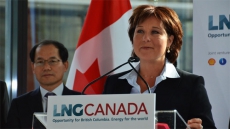CALGARY - The recent rout in oil prices will likely be top of mind for investors as Canada's top oilpatch players release their third-quarter results over the next few weeks.
The steep drop in the key U.S. benchmark crude — to about US$80 a barrel from around US$95 just a month ago — won't be evident in companies' financial reports for the quarter ended Sept. 30.
But analysts and investors will be paying keen attention to the mood of top brass on quarterly conference calls and looking for signals about how oil market volatility may affect future plans, said Lanny Pendill, an analyst with Edward Jones in St. Louis, Mo.
Right now, oil and gas producers are hammering out their budgets for 2015.
"As a whole, we're probably at the price point where I think many of the companies are going to approach the budget season with a little more caution," he said.
"Just the tone and the overall impression that they leave with us ... I think will be key. So we will certainly be focusing on the go-forward comments more than anything."
Projects under construction in northern Alberta should be in good shape, but prospects are less certain for some that haven't yet received a final board arrpoval, said Pendill. In recent months, Canadian units of France's Total and Norway's Statoil have opted not to proceed with their Joslyn and Corner oilsands projects, respectively.
Cenovus Energy Inc. (TSX:CVE), one of Canada's top oilsands producers, will be reporting on Thursday. That company has developed a reputation as being one of the lowest-cost producers in the industry, and Pendill expects it to continue to thrive in the current oil price environment. Supply costs for its projects range between US$35 and US$65 a barrel, meaning even its most pricey projects can generate a decent profit.
Cenovus extracts bitumen using steam-assisted gravity drainage, or SAGD, technology. Steam is pumped underground through a well, where it softens the tarry bitumen enough that it can be drawn to the surface through a second pipe.
Steam-driven, or in-situ, projects are generally much more cost effective than the more traditional surface mining operations. Since most of the remaining oilsands resource in northern Alberta is too deep to be mined, most future projects will employ in-situ techniques.
Husky Energy Inc. (TSX:HSE), also on deck to report Thursday, is close to starting the first phase of its Sunrise SAGD project, part of a partnership with BP. The company has signalled that costs would be higher than its most recent estimate of C$2.7 billion, but hasn't yet said by how much.
Oilsands producers learned some hard lessons during the financial crisis of 2008 and 2009, said Pendill. The oilpatch saw a spate of high-profile project deferrals as crude prices cratered to levels that were at times less than half of what they are today.
Those companies have since done a better job managing their debt. They've also become reluctant to undertake multibillion-dollar megaprojects. Instead, companies like Cenovus and Suncor Energy Inc. (TSX:SU) are building SAGD projects in bite-sized increments, essentially copying and pasting the design with each new phase. Miners, like Canadian Natural Resources Ltd. (TSX:CNQ) and Suncor, are boosting output through "debottlenecking" — squeezing more crude out of existing projects by tweaking equipment, rather than building something new from scratch.
Oilsands projects, many operated by deep-pocketed multinational giants, are planned with a time horizon of 50 years or more in mind, said Sonny Mottahed, CEO and managing partner at Black Spruce Merchant Capital in Calgary.
The industry pays attention to the long-term supply-demand trends in oil prices, not the reactions of traders on any given day, he said.
"Generally speaking, I don't think that there's anybody out there that believes that there is a true fundamental reason for the sell-off in the commodity," he said.
It's a gloomier story for smaller firms elsewhere in the oilpatch, said Mottahed. Lower prices are going to hit cash flow, which is bad news for companies that need to recycle capital back into their business quickly in order to keep drilling.
Oilsands producers have been cushioned from the crude price plunge on a couple of fronts. Currency fluctuations have been to the benefit of Canada's oilpatch, as the loonie has weakened against the U.S. dollar. And the price gap between heavy and light oil has narrowed as more Canadian heavy crude has been able to find its way to market by pipeline, rail and even tanker, Scotiabank commodity market specialist Patricia Mohr noted in a report last week.
While U.S. light oil production surges from shale deposits in Texas and North Dakota, the country's imports of heavier crudes continues to climb, Mohr wrote in her latest Commodity Price Index. Canada has supplied 43 per cent of U.S. heavy crude imports so far in 2014 and further gains are likely to the U.S. Gulf Coast in 2015.





